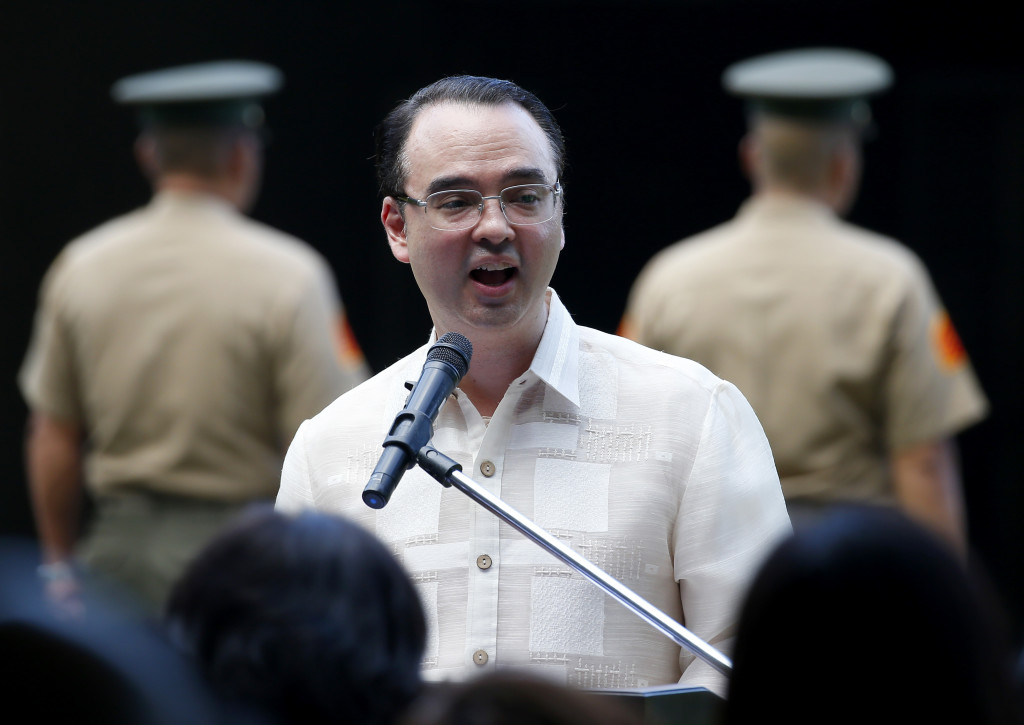Malacañang on Monday urged Filipinos in South Korea and Guam to inform the Department of Foreign Affairs (DFA) of their whereabouts, although tensions on the Korean Peninsula eased slightly after key South Korean and US officials played down the risk of an imminent war with North Korea.
Foreign Secretary Alan Peter Cayetano also advised Filipinos in Guam and other countries at risk if war with the North broke out to stay calm and go about their daily activities normally.
Cayetano said he would ask the Philippine consulate in Agana as well as the Philippine embassies in countries around the Korean Peninsula to use social media in informing Filipinos of their contingency plans.
Monitoring situation
Presidential spokesperson Ernesto Abella also said the Philippine Embassy in Tokyo was monitoring the situation on the Korean Peninsula in preparation for any eventuality.
“We commend our Seoul Embassy and our Guam consulate for their contingency plan to secure Filipinos if and when military conflict erupts,” Abella said in a press briefing.
“We ask all Filipinos in Guam and Korea and their families here to inform [the] DFA or our consular officials of their whereabouts,” he said.
The DFA said 42,835 Filipinos lived in the US territory of Guam. On Sunday, the Philippine consulate advised them to stay alert and “watch unfolding events” and monitor “reports from reliable media” and “official advisories from the government of Guam and the Guam Homeland Security-Office of Civil Defense.”
According to the Commission on Filipinos Overseas, there are more than 69,000 Filipinos in South Korea and 243,000 in Japan as of 2013.
When asked about preparations by the Philippine Embassy in Tokyo, Abella said: “I’m sure they are in the loop and are also on the lookout regarding the matter, considering that there are a large number of Filipinos in Japan.”
Abella reiterated Manila’s call for all parties involved in the tensions over North Korea’s nuclear weapons program and intercontinental ballistic missile (ICBM) tests to exercise restraint.
“We continue to enjoin all concerned parties to desist from threats and military action and we enjoin all sides to start talks, which should be greatly facilitated by an end to missile test and attack threats,” he said.
Tensions between the United States and North Korea escalated on July 28 after Pyongyang tested an ICBM that could reach the continental United States.
In response, the United Nations Security Council on Aug. 5 imposed sanctions on North Korea.
“North Korea best not make any more threats to the United States. They will be met with fire and fury like the world has never seen,” US President Donald Trump said on Aug. 8.
Two days later, the head of North Korea’s strategic missile forces outlined a plan to launch missiles into the waters around Guam, which hosts US military bases that would be crucial if war erupted on the Korean Peninsula.
On Monday, South Korean President Moon Jae-in said resolving Pyongyang’s nuclear ambitions must be done peacefully.
“There must be no more war on the Korean Peninsula. Whatever ups and downs we face, the North Korean nuclear situation must be resolved peacefully,” Moon told a regular meeting with senior aides and advisers.
“I am certain the United States will respond to the current situation calmly and responsibly in a stance that is equal to ours,” he said.
Risk of war played down
Moon spoke after US officials, including National Security Adviser HR McMaster, played down the risk on Sunday of the rhetoric escalating into conflict.
“I think we’re not closer to war than a week ago, but we are closer to war than we were a decade ago,” McMaster told ABC News’ “This Week.”
US Central Intelligence Agency Director Mike Pompeo said North Korean leader Kim Jong-un might well conduct another missile test but talk of being on the cusp of a nuclear war was overstating the risk.
“I’ve seen no intelligence that would indicate that we’re in that place today,” Pompeo told Fox News Sunday.
North Korea, however, reiterated its threats, with its official KCNA news agency saying “war cannot be blocked by any power if sparks fly due to a small, random incident that was unintentional.”
“Any second Korean war would have no choice but to spread into a nuclear war,” it said in a commentary on Monday.
South Korean Vice Defense Minister Suh Choo-suk agreed North Korea was likely to continue provocations, including nuclear tests, but did not see a big risk of the North engaging in actual military conflict.
Suh again highlighted doubts about North Korea’s claims about its military capability.
“Both the United States and South Korea do not believe North Korea has yet completely gained reentry technology in material engineering terms,” Suh said in remarks televised on Sunday for a Korea Broadcasting System show. —With reports from the wires


